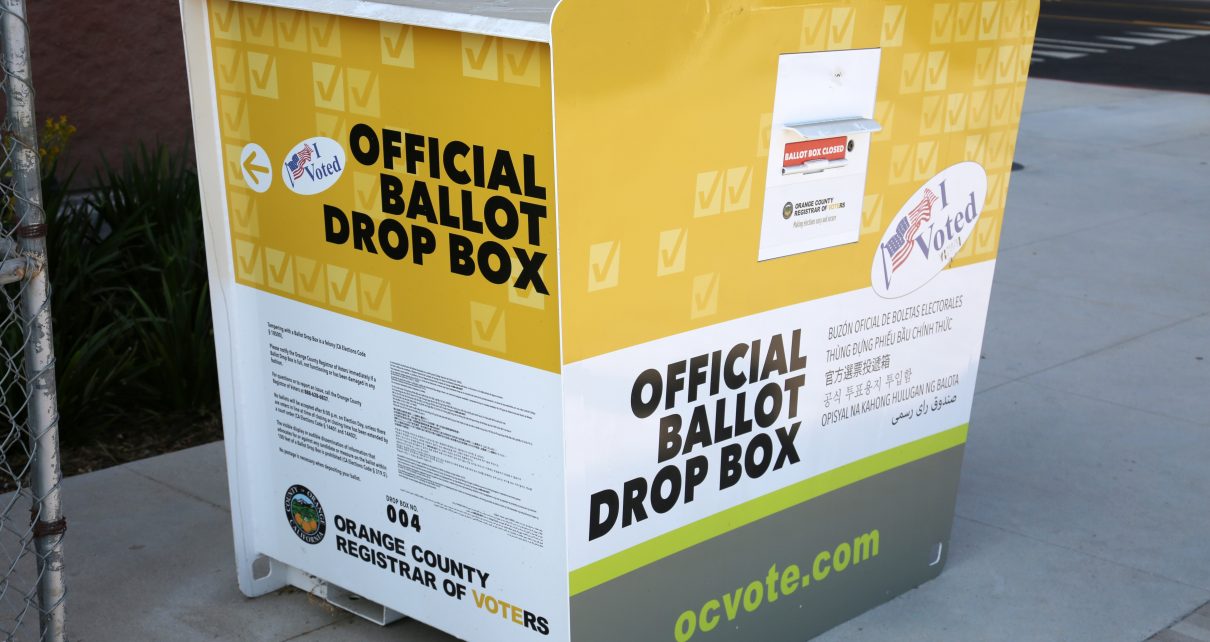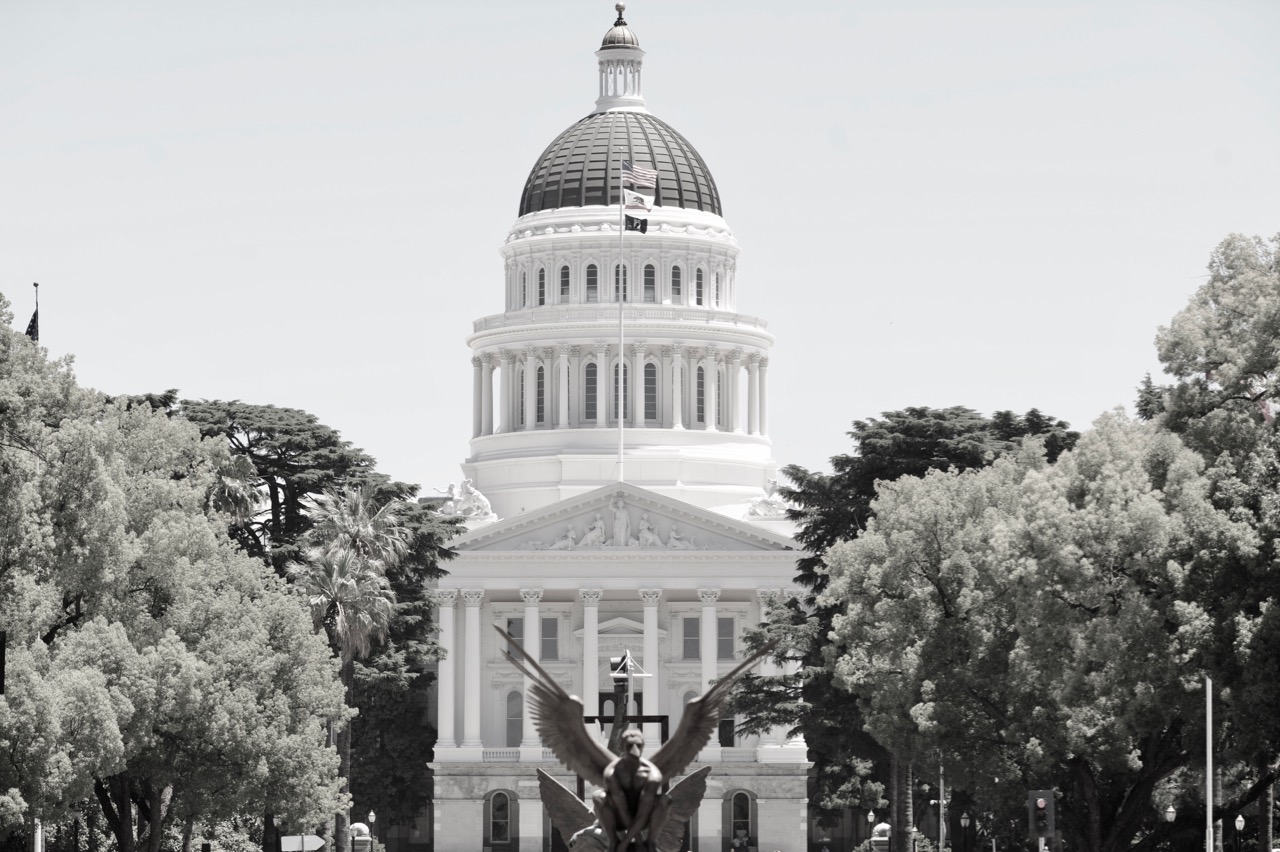
Official Ballot Drop Box placed ready to accept Voting Ballots for the upcoming election. Santa Ana, CA, Sept. 23, 2020. (Photo: mikeledray/Shutterstock)
Globe Quiz on California Political and Elections Laws
T or F: All local offices are elected on a partisan basis
By Chris Micheli, April 29, 2023 6:57 am
This quiz is to test your knowledge about California’s political and election laws.
- Like federal judgeships, California appellate court justices serve lifetime appointments.
- Trial court and appellate court judges are all appointed by the Governor and then subject to confirmation by the JNE Commission.
- In California, the two candidates who proceed to the November general election are the two candidates with the most votes at the primary.
- California legislators are allowed a maximum of fourteen years of service in either house or a combination of the two houses.
- A legislator can sit out two election cycles and then the term limits law begins anew.
- In California, corporate contributions can be made. However, at the federal level, they are prohibited.
- A business can make political action committee (PAC) campaign contributions that combines individual contributions into the PAC at both the federal and state levels.
- Some local jurisdictions in California use ranked-choice voting.
- Some local governments utilize a multi-winner election in which multiple candidates can be elected to the same office (such as the city council).
- The Independent Citizens Redistricting Commission draws district lines for congressional, state legislative, and county supervisorial districts.
- All nine statewide officers are elected on a partisan basis
- All local offices are elected on a partisan basis.
- All lobbying disclosure forms are filed on a quarterly basis.
- The Legislature can disqualify electors who are mentally incompetent or serving a state or federal prison term for the conviction of a felony.
- An elector who is disqualified from voting while serving a state or federal prison term is required to have their right to vote restored upon the completion of their prison term.
- Voting is required to be secret.
- The Secretary of State is the chief elections officer for the state and is charged with administering the Elections Code.
- The Secretary may send election information to voters electronically.
- The Political Reform Act requires the Fair Political Practices Commission to regulate campaign finance laws, conflicts of interest for local and state public officials, lobbyist registration and reporting, political mass mailings, gift laws, legislative documents, and the State Archives.
- Although the Governor (with 2 appointees), Attorney General, the Secretary of State, and the Controller each appoint one member of the FPPC, only the Governor can remove any of the five commissioners.
- Ballot “selfies” are prohibited under California law because voting is secret.
- California has a “Voter Bill of Rights”
- There are spending limits for State Senate and State Assembly races.
How did you do? The following are the answers:
- False – California judges do not serve lifetime appointments. They are ultimately subject to voter approval through the use of a retention election.
- False – trial courts judges are not subject to confirmation by the JNE Commission.
- True – California uses a top-two primary system.
- False – the total number of years to be served is twelve.
- False – the twelve years is a lifetime limitation.
- True – corporate campaign contributions are permissible under state law, but not federal law.
- True – this is required at the federal level, but can be used at the state level as well.
- True – the City of Oakland, for example, uses ranked-choice voting to elect its mayor.
- True – this is used in a number of jurisdictions throughout the state.
- False – the commission draws lines for Members of Congress, State Senate, State Assembly, and State Board of Equalization.
- False – the Superintendent of Public Instruction runs on a nonpartisan basis.
- True – this is pursuant to the state Constitution.
- False – most are due each quarter, but Form 602 (Lobbying Authorization) is filed upon a lobbying firm being hired by a lobbyist employer.
- True – this is permitted by the state Constitution.
- True – this is a constitutional requirement.
- True – pursuant to Section 7 of Article II.
- True – this is pursuant to the Government Code.
- True – this is pursuant to the Government Code.
- False – the first five are specified in the Government Code, but the other two are not included.
- False – the members of the FPPC may be removed by the Governor, with concurrence of the Senate, for substantial neglect of duty, gross misconduct in office, inability to discharge the powers and duties of office or violation of specified sections of law.
- False – California enacted AB 1494 in the 2016 Session, which repealed a 125-year old law barring voters from showing people their marked ballots. It specifies that “a voter may voluntarily disclose how he or she voted if that voluntary act does not violate any other law.”
- True – it is found in Elections Code Section 2300.
- True – to accept the spending limits, candidates running for state Senate or state Assembly must file a Candidate Statement of Intention (Form 501) with the Secretary of State’s Political Reform Division indicating whether they intend to abide by the spending limits prior to submitting a candidate statement.
Latest posts by Chris Micheli (see all)
- Service of Summons in California Civil Actions - December 11, 2024
- Sunset Clause Versus Repeal Clause - December 10, 2024
- Describing a Spot Bill - December 9, 2024





True – Corruption is endemic in CA voting thanks to Alex Padilla buying and installing Dumb Onion electronic voting systems statewide, before he skated off to the D.C. swamp